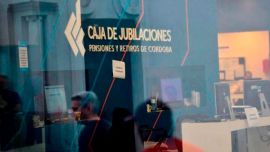Argentina is continuing to work with the International Monetary Fund on a deal to restructure US$44 billion in debt owed to the multilateral lender, President Alberto Fernández said Thursday.
The Peronist leader delivered the remark via a post on Twitter, following a video call with IMF chief Kristalina Georgieva.
"This morning I had a very good conversation with the managing director of the Monetary Fund, Kristalina Georgieva. We agreed to continue working on a programme designed and conducted by Argentina, with the support of the organisation," the president said.
Both parties stressed "the importance of economic recovery and fiscal order consistent with that growth, as necessary conditions for stabilisation," said Fernández.
The Frente de Todos leader said both had agreed that "the programme must have a realistic vision of how our economy works."
For her part, Georgieva said on Twitter that she had "a very good call" with the president of Argentina.
“We discussed prospects for global growth and actions to combat the health and economic crisis,” she added, noting the IMF’s aim to “enhance stability and support strong, inclusive growth.”
She also threw in a word for Martín Guzmán, highlighting her team’s “great collaboration” with Argentina’s economy minister.
The government is hoping to renegotiate repayments on a US$44-billion loan granted to the Mauricio Macri administration by the Fund in 2018. The credit line was originally meant to be US$57 billion, but President Alberto Fernández halted disbursements when he took office in December 2019. The first repayments are due in September 2021.
The government plans to ask the IMF for an Extended Fund Facility (EFF) arrangement as part of the government's efforts to delay repayments on its debt. Typically, EFF schemes require economic reforms as part of any deal.
Guzmán has previously told reporters that the government is seeking a decade-long grace period on repayments.
Argentina’s economy has been in recession since 2018 and registered inflation of 36.1 percent last year, according to official data. Increases in the price of a basic basket rose 45.5 percent, driving an increase in poverty that now exceeds 40 percent of the population.
GDP declined by 11.3 percent year-on-year between January and October 2020 amid the coronavirus pandemic and accompanying lockdown. The IMF estimates that Argentina’s economy contracted by 11.8% last year.
– TIMES/AFP
























Comments